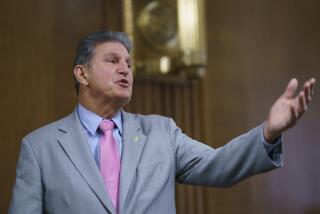Volcker Warns of Deficit Dangers : Says Recovery Fueled in Large Part With Foreign Investment
- Share via
WASHINGTON — Congress must make substantial progress toward reducing federal budget deficits or risk jeopardizing “our hard-won gains and the bright promise of our future,” Federal Reserve Chairman Paul A. Volcker warned Friday.
In some of his toughest comments on the deficit issue, Volcker said that it would be folly to be lulled into a false sense of security by the strength of the economic recovery. He said the recovery has been financed in large part by volatile foreign investment.
Volcker, in an appearance before the Senate Budget Committee, repeated his contention that at least $50 billion in deficit reduction was needed to assure domestic and foreign financial markets of the U.S. government’s resolve to get its house in order.
The budget that President Reagan sent to Congress earlier this week would reduce the projected deficit by about $50 billion, to $180 billion, in the fiscal year beginning Oct. 1.
“We have severe imbalances in the economy and we have to begin dealing with them,” Volcker said. “We have been able to reconcile the imbalances at home by drawing savings from abroad. I don’t know how long we can go on this way.”
Volcker said the growing foreign investment in this country, while helping finance the government’s debt, had hurt farmers, steelmakers, the heavy machinery industry and others who were either dependent on export sales or were facing stiff competition from imports.
The stampede by foreigners to invest in the United States has pushed the dollar to record highs against other foreign currencies, Volcker said, hurting farmers and industries that have to sell their more expensively priced goods overseas.
In his testimony, Volcker said preliminary figures showed that foreign investment supplied 23% of net savings in the United States in 1984, up from 12% the year before.
“There are large imbalances in our economic performance and points of severe strain here and abroad,” Volcker told the senators.
Volcker said the economy’s recent performance was based on “things that can’t last.” He said the next recession could be triggered prematurely by a sudden drop in foreign investment. He did not predict when the next recession might occur, but he did note that it would be unusual, given the history of business cycles, not to have an economic downturn before 1990.
More to Read
Inside the business of entertainment
The Wide Shot brings you news, analysis and insights on everything from streaming wars to production — and what it all means for the future.
You may occasionally receive promotional content from the Los Angeles Times.










